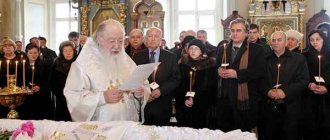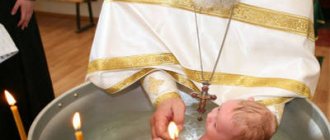Orthodox Christians have a tradition of giving away things and sweet treats to commemorate a deceased person. There are different customs in different areas, and there are differences in what and how is distributed on different memorial dates. These beliefs explain how many sweets should be in each bag prepared for funeral alms, what exactly is given to those who come to the funeral, on the 9th, 40th days, for six months and a year. They advise when to give away the deceased’s belongings. However, theologians are confident that trying to observe all these rituals too strictly is not only unnecessary, but even harmful. After all, the main thing in commemoration is respect for the deceased, prayers for the repose of his soul and good memory of his earthly deeds.
The meaning of the tradition of giving gifts at funerals
The Bible does not have clear instructions about when the things of a deceased person are distributed, or explanations of when and what exactly to give at a wake. The custom of giving something to people who came to remember the deceased dates back to the ancient pre-Christian rituals of Kievan Rus. With the advent of Christianity, Orthodox priests began to support these traditions. Remembering the deceased is a godly deed. Items obtained in this way should be constantly used and remind of the deceased. They need to be used carefully so that the bright memory of this person is preserved longer. The more often he is remembered with kind words, the better his soul is in the afterlife. They say that a dead person who is forgotten and not remembered finds no peace. His relatives who have forgotten him begin to worry about insomnia and nightmares.
Items received as gifts at a funeral do not carry negative energy. They preserve the positive message of the giver, the warmth of his words spoken when giving.
Some funeral table recipes
Of course, every housewife wants to diversify the strict funeral meal with something special in order, on the one hand, to please the soul of the deceased (especially if he loved to eat deliciously during his lifetime), and on the other hand, to please relatives and guests invited to the funeral. However, it is not at all necessary to turn a funeral dinner into a feast like the same ancient Slavic funeral feast, investing almost all your savings in it. It will be quite sufficient to add one or two treats from the optional to the dishes from the mandatory and generally accepted menu. And to make the preparation of these dishes easier, we will be happy to share recipes for some that will certainly diversify your table.
There is no need to dwell on how to prepare the same mashed potatoes with meat or Olivier salad. And here, for example, is a recipe for preparing such a snack as ham rolls:
- thinly slice 300 gr. ham (if you purchased it whole).
- prepare the filling: hard-boil 3 eggs, separate the yolks from the whites and grate them into different bowls (whites on a coarse grater, yolks on a fine grater); On the same coarse grater, grate 2 processed cheese or 200 grams. hard cheese; wash, dry and finely chop the greens; Peel and squeeze 2 cloves of garlic through a garlic squeezer.
- combine all the filling components (except the yolks), add mayonnaise and mix well.
- arrange the ham, placing 1 tbsp/dec. on the edge of each slice. spoon of filling and roll into a roll.
- Dip each roll in mayonnaise and roll in grated yolks.
- Place lettuce leaves on a plate, place rolls on them and garnish with herbs.
Or - an equally simple snack called “tomatoes with fish salad”:
- Wash 5-6 tomatoes, cut off their tops and carefully scoop out the pulp using a teaspoon.
- Boil and grate (or chop) 5 eggs, mixing them with tomato pulp.
- mash the contents of 1 can of canned food in oil with a fork, season it with mayonnaise and, if desired, add a little finely grated cheese, then salt, pepper and add herbs.
- combine and mix grated eggs and canned food.
- salt the tomatoes inside and fill them with filling, then place on a plate and garnish with herbs, if desired - with handfuls of grated cheese or green peas.
Finally, here is the recipe for the “ladder” cookies we already mentioned:
- make the starter: stir 1 package of dry yeast with 5 tbsp. l. sugar, add 300 ml to the mixture. warmed milk, 3 eggs and 50 gr. butter, then add 3 tbsp. l. flour, mix and place in a warm place for 30 minutes.
- sprinkle half a kilogram of fresh or frozen berries with sugar to taste (you can use any variety). If desired, you can keep them on low heat for a while.
- sift the remaining flour (the recipe calls for half a kilogram of flour in total), pour it into a container, make a well in the middle and gradually add the starter.
- mix everything, sprinkle flour on top so that the dough does not dry out, and put in a warm, wind-free place for another 2-3 hours, kneading it two more times during this time.
- When the dough is ready, roll it in flour mixed with aromatic seasonings, then divide into two parts. Make a cake from one, and a ladder from the second.
- Place the berries on the flatbread, cover it with a ladder, decorate it with berries and raisins, brush with yolk or milk, leave for 15-20 minutes. and then place in the oven at +200 for 20 minutes.
One very interesting custom of fortune telling is associated with these cookies, which, perhaps, very clearly shows how folk traditions have mixed with religious ideas. In the old days, they threw it from the bell tower and, based on the number of pieces into which it scattered, they guessed about the future fate of the soul of the deceased person. If several pieces fell off the ladder, then heaven was destined for the soul, since it was believed that the deceased led a righteous lifestyle; if the ladder shattered into small pieces, then the deceased was a sinner and his relatives faced long days of prayer to ease the afterlife fate of his soul.
What is handed out at funerals at different times?
In most cases, this depends on the traditions accepted in a particular area. Therefore, the list of things and treats that are distributed on different memorial days in different parts of the country may differ markedly. In some areas, only spoons are given as tableware, believing that other items can retain the sad energy of a funeral. In other places they give mugs, plates, saucers, etc. and do not see any danger in them, only a bright memory of the deceased. Depending on the adherence to these rituals, several such gifts can be given. For example, hand out handkerchiefs on the day of the funeral, cups on the 9th day, and spoons on the 40th day. Or you can limit yourself to just one gift given at a funeral. For example, a scarf or towel given at a wake on the day of burial. All these items must be new and did not belong to the deceased. They are usually purchased in preparation for a funeral.
What do they give out at the wake on the day of the funeral?
People who come to a funeral usually receive handkerchiefs and small towels as gifts. Sometimes, according to the traditions of a certain area, small pieces of soap may be added to them. Depending on local customs, handkerchiefs or towels may be distributed before the funeral activities or after the funeral dinner. Those who were present at the meal are certainly given a treat of sweets, pies, cookies, gingerbread, boiled eggs, etc. The same bags of sweet alms can be distributed to people you meet on the way from the cemetery. When presenting this gift, they ask to pray for the deceased, remembering his name in prayers.
According to legend, until the first three days have passed after death, the deceased’s belongings are not distributed. Traditionally, they try not to touch anything in the room or house of the deceased for up to 40 days. But in fact, the church does not prohibit distributing the deceased’s belongings at this time. On the contrary, it is believed that the more people pray for the deceased and remember him, the better his soul is. Relatives who come from afar for the funeral must certainly give away those things that they want to take away in memory of the deceased, and ask them to pray for the repose of his soul.
What do they give for 9 days in memory of the deceased?
On this day, a memorial service and other memorial services are ordered in the church. On the way to the temple, you can distribute funeral alms. The meal prepared in advance is given to people they meet, neighbors, strangers, the poor, etc. At the same time, they are asked to pray for the soul of the newly deceased, saying his name. Nothing that is placed on the funeral table on this day should be thrown away. Even crumbs scattered on the table must be collected and given to the birds. The belief says that by pecking them, they will quickly deliver prayer to the Lord. The remains of the meal are distributed to the poor or given to guests gathered for the funeral. Theologians assure that there is no bad energy in the food from the funeral table, it will not harm the one who eats it.
What does 40 days give for a wake?
At this time, people most often go through the deceased’s belongings. Relatives and friends take for themselves those items that will remind them of the deceased. The remaining neat, clean things that are suitable for wear and use can be taken to the temple so that they can help pass them on to those in need. If possible, you can give them to the poor yourself. Priests advise giving away as many things as possible for future use, rather than throwing them in the trash.
What do they give out at funerals for 1 year and 6 months?
Commemoration for six months is a relatively new, not universally established folk tradition and is not considered mandatory according to church canons. It is not necessary to have a memorial meal on this day. Sometimes only the closest people of the deceased are gathered at such a table, or they make do only by distributing sweet treats to the relatives, friends, neighbors and acquaintances of the deceased in honor of his soul. On such days, when ordering funeral services, they give alms in churches for church repairs, for church holidays, for fresh flowers and other needs. To do this, they leave money in special boxes placed in churches.
1 year is considered a more significant date. It is important to start this day with a prayer for the repose of the deceased. After this, they usually go to the temple to order a memorial service, commemoration at the proskomedia, magpie, litia. They consecrate the kutya for the funeral table. Commemoration on an anniversary is also a reason to leave monetary alms in the temple. In addition, food is left on the funeral table, which is then distributed to the needy or used to prepare temple lunches. These can be any long-stored products. For example, flour for baking prosphora, cereals, jams, pasta, sweets, bread, fruit, etc. You can bring Cahors and lamp oil. On the anniversary of death, it is considered godly to donate money or some things to nursing homes and orphanages. A sweet treat of sweets, cookies, pies, gingerbreads and other baked goods, as on other memorial days, is distributed at the funeral for the year to all those gathered for the memorial dinner and to people they meet on the way to the temple or cemetery.
On the ninth day after the funeral
On the ninth day, it is customary to order a prayer service in the church. While going to church, you can give out treats to low-income people or people you meet.
The funeral on the ninth day takes place in a narrow circle of relatives with the preparation of a more modest dinner, the remains of which are given to those present.
On this day, it is customary to distribute sweets, pastries, and boiled eggs. Instead of things, you can give out small coins with a request to pray for the deceased.
How many candies are handed out at funerals?
In some areas there is a belief that there must be an even number of sweets in a funeral bag, as well as flowers brought to the cemetery. In other places, even with treats not related to the wake, they give an even number of candies. It doesn't really matter how many of them are served. Funeral candies are distributed not at all to strengthen superstitious rituals and not to offend people for their incorrect performance. This commemoration is needed so that people, while eating sweets, remember the deceased and wish him a sweet heavenly life in eternity. Treats of sweets, cookies, pies, etc. are usually handed out at wakes and brought to work to ask colleagues to remember the deceased.
Spoons and mugs
These items can be distributed on the day of the funeral, those who came for 9 days or on the fortieth day. According to tradition, at the end of the funeral meal, those who came to remember the deceased simply take with them the spoons with which they ate. If a wake is organized in a cafe or restaurant, they usually warn that no one takes the establishment’s equipment with them. To distribute such a commemoration, devices are specially prepared that can be given away before the guests leave. Good wishes are extremely important. Objects and treats given with bad thoughts will not benefit the spirit of the deceased.
There is an opinion that the round shape of spoons and cups is especially good at preserving good energy and the warmth of words spoken at the table. Like any other utensils, spoons or cups received in memory of the deceased should be washed. Carrying out any specific rituals inherent in pagan beliefs (with salt, fire, etc.) is not only unnecessary, but even harmful. In Orthodoxy, superstition and related rituals are considered a sin.
Why is it customary to present towels and scarves?
The custom of giving a scarf has existed for many decades and is an ancient ritual.
The purposes of distributing scarves are:
- • Wrapping a candle to prevent hot wax from burning your hand or staining your clothes.
- • Elimination of tears that have arisen
- • To remind a deceased person who should be remembered with warmth.
The scarf can be held in your hand or put in your pocket. Pallbearers must wear a scarf on their hands. Elderly people know this tradition well and begin collecting long before death.
When things of a deceased person are given away
Many superstitions have accumulated around the belongings of a deceased person. For example, it is believed that things cannot be touched or given away until the 40th day from the moment of his death. That you cannot leave the deceased’s belongings in your home, use them or wear them. You cannot enter his room and clean it. In fact, theologians do not insist that all things must be given away. They also do not indicate the exact time when this should be done. Some priests say that those items that are destined to become alms can and should be given before the 40th day. Indeed, at this time the soul of the deceased requires special prayerful commemoration. During these periods, it is decided where exactly the soul of the deceased will end up: in heaven or hell. The grateful prayers of the people who received these things will help the spirit of the deceased.
Only the heirs can decide what to do with certain things left behind by the deceased. At the same time, it is important not to fall into superstitions. There is no need to rush to give away everything you have immediately after the funeral. There is no need to strive to give away 40 things on the forties. It is important that the result of this alms be a sincere prayer for the repose of the deceased. 40 days after death is a time that is especially painful for the relatives of the deceased. Important life decisions are usually not made at this time. But, if suddenly a person appears who needs a specific item or several things that previously belonged to the deceased, and there is no reason to keep it in the family, you definitely need to give it away. In this case, there is no need to specifically wait for the 40th day. To ensure that things continue to serve people, you can turn to special collection points for things for those in need. Of course, all items intended for donation must be clean and in good condition. Therefore, there is no sin in washing the deceased’s belongings before donating them to those in need. Broken and dilapidated things that can no longer be used, of course, will simply have to be thrown away.
Memorabilia of the deceased should certainly remain in the family or be given to those people who would like to take them in memory of him. They can and should be worn, they can and are important to use. The superstition that the negative energy of a funeral or some sins of the deceased can transfer to things and bring trouble to the house does not in any way relate to the Orthodox faith. By frequently using these items, people will more often remember the deceased and offer prayers for his repose. It is only important that these items are not forgotten, not put away in closets and pantries, because this is the path to oblivion of the deceased person. You should also not refuse to clean the room of the deceased. The interior covered with a thick layer of dust only speaks of disrespect for its spirit. Even in those places where everything remains “as in life,” in the cells of deceased holy elders or in museums of famous people, repairs and cleaning are certainly done.
What to do with a memorial offering
When accepting the gift, they certainly wish the Kingdom of Heaven to the deceased. It is best to use the items received in everyday life, remembering the deceased each time. This is exactly what they are designed for. You should not be afraid of the negative energy of a funeral; it does not accumulate in these objects. But still, if you don’t want to use such things and keep them at home, you can give them away. For example, you can bring it to the temple and put it on a special table for alms, give it to someone or give it to those in need. The Church does not see this as a sin.
Almost any of the memorial alms carries the most important task - a reminder of the deceased and a request to pray for his repose. Therefore, it does not matter what form it takes (a sweet treat, a spoon from a funeral, or a personal item of the deceased). The deceased no longer cares about worldly goods and material objects; the only thing his soul asks for is remembrance and sincere prayer. Of course, you should not strictly adhere to the “severe requirements” of superstitions. This will not benefit either the living or the dead and, moreover, is not approved by the church. However, sometimes, for the sake of peace of mind and a sense of “correctness,” it is worth giving in to older relatives and allowing them to follow the established “rules” that are familiar to them.
Ask Father No. 83 (When to distribute the deceased’s belongings, how to spend 40 days after death)
Anniversaries
If the relatives wish, a memorial service can be organized six months after the death. There are no prohibitions here, since everyone chooses for themselves how many times and when to commemorate the dead. Since, in addition to generally accepted dates, as already mentioned at the beginning of the article, there are individual ones. This is the birthday of the deceased, the anniversary of any significant events in his life. Therefore, if you are tormented by doubts about whether the wake will be held for six months, then you should proceed from your own wishes.
Memorial days
Visit to the cemetery
Funeral poems
After the first days, the time comes when a wake is organized for the anniversary of the death. They, like everyone else, are not invited to them. Everyone comes, and the funeral table is set for them again. Funerals 1 year after death begin with a visit to the cemetery. Now you can erect a monument on the grave of the deceased, improve it and the site as a whole. Funerals for 1 year do not have their own special traditions. Visit the grave and gather around the table, talk about the good things that the deceased left in memory of himself.











